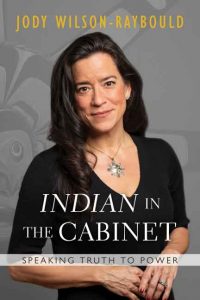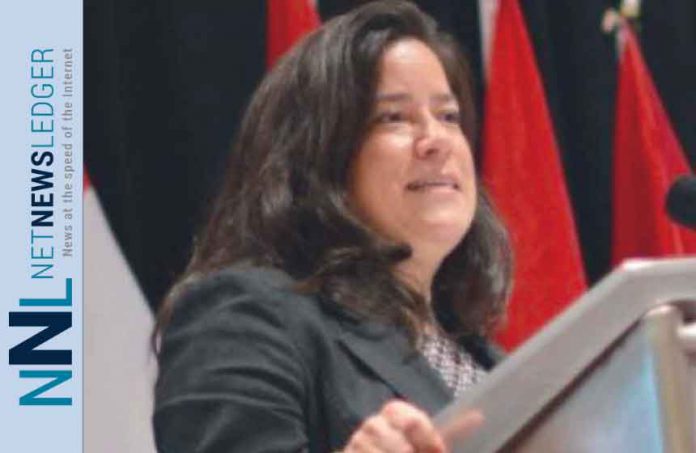Indian in the Cabinet
By Jody Wilson Raybould

This is an excerpt from “Indian in the Cabinet” a book written by former MP and former Liberal Cabinet Minister Jody Wilson-Raybould.
The sun was flooding through the third-floor windows of the Signature private plane terminal at Vancouver International Airport as I sat waiting for the Prime Minister to arrive. The terminal is distant and isolated, far from the bustling main terminal and the eyes of the public and the media. My husband, Tim, had dropped me off and then parked to wait for me among the cars of the Prime Minister’s motorcade. The PM was late. Building in me was a creeping realization that this was the beginning of the end. It was here. The time had come.
It had been three days since Robert Fife’s front-page story in The Globe and Mail_ set off a series of ongoing convulsions over the Liberal government’s attempts to “pressure” me on the prosecution of SNC-Lavalin. As soon as the story broke, the Prime Minister said that “the allegations in The Globe _story this morning are false. Neither the current nor the previous attorney-general was ever directed by me or by anyone in my office to take a decision in this matter.” The government’s response over the next 72 hours had been a case study in hubris – at once both surprised that they had been caught and offended that anyone could think they would ever do anything wrong. In the Indigenous political world I had come from, we always talked about how government practice, for generations, was to deny, delay, and distract when it came to Indigenous issues. I had heard that phrase – deny, delay, and distract – since I was a kid. The past three years had shown me that governments use that strategy far beyond their dealings with Indigenous peoples. Sometimes all Canadians are treated contemptuously. On SNC-Lavalin, few were buying it. And they were right to be skeptical.
About the Book
A compelling political memoir of leadership and speaking truth to power by one of the most inspiring women of her generation
Jody Wilson-Raybould was raised to be a leader. Inspired by the example of her grandmother, who persevered throughout her life to keep alive the governing traditions of her people, and raised as the daughter of a hereditary chief and Indigenous leader, Wilson-Raybould always knew she would take on leadership roles and responsibilities. She never anticipated, however, that those roles would lead to a journey from her home community of We Wai Kai in British Columbia to Ottawa as Canada’s first Indigenous Minister of Justice and Attorney General in the Cabinet of then newly elected prime minister, Justin Trudeau.
Wilson-Raybould’s experience in Trudeau’s Cabinet reveals important lessons about how we must continue to strengthen our political institutions and culture, and the changes we must make to meet challenges such as racial justice and climate change. As her initial optimism about the possibilities of enacting change while in Cabinet shifted to struggles over inclusivity, deficiencies of political will, and concerns about adherence to core principles of our democracy, Wilson-Raybould stood on principle and, ultimately, resigned. In standing her personal and professional ground and telling the truth in front of the nation, Wilson-Raybould demonstrated the need for greater independence and less partisanship in how we govern.
“Indian” in the Cabinet: Speaking Truth to Power is the story of why Wilson-Raybould got into federal politics, her experience as an Indigenous leader sitting around the Cabinet table, her proudest achievements, the very public SNC-Lavalin affair, and how she got out and moved forward. Now sitting as an Independent Member in Parliament, Wilson-Raybould believes there is a better way to govern and a better way for politics—one that will make a better country for all.
I wished it had not come to this. I felt a familiar conflict inside of me that had been there my whole life: A deep desire to believe in people. To expect the best out of them. To want them to do the right thing. Almost a protective desire to see them do right. And yet simultaneously knowing that sometimes this does not happen. That when people act a certain way time and again, they are likely to repeat it, whatever my hopes and wishes may be.
As I sat there in that room – a big room, all by myself – waiting for Prime Minister Justin Trudeau to arrive, I asked myself why I felt that I had to try to help him out of this mess, to protect him. Especially when his government had been digging a deeper and deeper hole by the hour by not coming clean on how I was pushed to take over the prosecution of SNC-Lavalin to enable them to enter into a deferred prosecution agreement, or DPA. Especially when his office had been telling their MPs to repeat lines they knew were not accurate.
I was anxious as I sat there. I could feel my lingering hope that I would be proven wrong and that everything was not as terrible as it seemed. I wished that the government would just admit their wrongdoing and deal with it openly and transparently. I knew the only way to deal with it was to tell the truth. Full transparency. It was as clear to me as sunlight. The Prime Minister had to simply acknowledge that the attempts to apply pressure were not proper and take concrete steps to address the wrong actions. Deep down I think I knew better than to expect him to own up. However, at that moment, I still wanted to give him the benefit of the doubt.
I saw the Canadian Armed Forces Challenger land and pull up to the private terminal. As the Prime Minister walked up the stairs, I could hear him talking to someone moments before he entered the room. He greeted me in his typically physical and warm way, with a hug and expressions of appreciation. “I so want you to keep being part of this government,” he said.
As always, from the first time I met him in Whitehorse in 2013, he reflected on the good we can do for the country. This is so Justin Trudeau. Taking control and setting the tone. Trying to remind everyone in the room – in this case me – who is in charge. “I don’t think that you leaked the story [to the Globe],” he said. Unless I told him otherwise, he added. A power play. He was trying to push the ball into my court.
Looking back, I do not think the Prime Minister had a clue what I was going to say in this meeting. As it turned out, this was the first of three private meetings with the PM over the next 36 hours, before I eventually resigned from his Cabinet. That resignation – and everything that led to it – would lead to him tossing me out of the Liberal caucus and then removing me as the confirmed Liberal candidate for Vancouver Granville in the 2019 general election.
The Prime Minister and I had not communicated since the Globe_ _story broke – not even by phone – but the world had exploded around me. The public and media barrage was unlike anything I had ever experienced or could ever have anticipated. And it was a similar firestorm for the Prime Minister and his office. Intrusive, relentless, and everywhere.
I know the Prime Minister had always considered me a bit of a challenge – not political enough, too independent-minded, and ultimately not part of the inner Liberal crowd. I think I was foreign and incomprehensible to him. After all, I was from the other side of the tracks. I was an Indigenous girl from a small fishing village – Cape Mudge, on the southern tip of Quadra Island just off Vancouver Island. I am Kwakwaka’wakw. The PM did not grow up in my neighbourhoods, with the kids I grew up with. None of his family went to residential schools. My childhood memories are closer to Comox and Cape Mudge than Rockcliffe. My political point of reference was the Big House, not the House of Commons. To be fair, he did not choose how and where he grew up or who his parents were. But Liberals? Political parties? Not my world.
With the ice cracked but not broken, I started softly, reminding the Prime Minister where I had always stood. “I got into politics because there are issues that I am seriously committed to helping resolve.” I recalled for him then one of our first conversations when he was recruiting me for the party. We were in Whitehorse, and we had talked about our visions of the country and how we seemed to have similar views. I got involved with the Liberal Party largely because I believed we shared those views, and because I thought he would be a good prime minister and create a good team. I had believed all that I’d said to him five and a half years earlier. As I repeated it in that big airport room, I found myself wondering exactly when I first realized I had been wrong.
I got to the heart of the matter. “Since you brought it up, I did not leak the story, and it is absurd and offensive you would suggest that.” I wondered if he knew that I had warned Gerry Butts, his principal secretary, that I had been cornered by Robert Fife after Cabinet on February 5 as I came out of the elevator on the ground floor of West Block. Mr. Fife’s questions had been so detailed they indicated something explosive was coming. I rhetorically asked the PM about the leak: “Why would I ever do that?” There was so much I had come to Ottawa to accomplish. For Indigenous peoples and all Canadians. I had traded my life as I knew it to enter federal politics, just as I knew 337 other people had. Taking myself down, which in any scenario was the most likely outcome of the story leaking, did not advance those causes. Absurd. Like so much else that was to follow.
There is no question in my mind that the Prime Minister knew there were attempts to pressure me to avoid a criminal prosecution of SNC-Lavalin, and while those attempts failed, thankfully, they were wrong and he knew it. Instead of simply addressing the issue publicly and accurately, the government was sending out talking heads – the new attorney-general, David Lametti; Marco Mendicino; Arif Virani – to make comments that evidence has now shown were not accurate or right. I told him that he should be telling Canadians the truth.
The Prime Minister seemed to be listening intently. “I never directed,” he said, referring to interfering in my role as the attorney-general in relation to the SNC-Lavalin prosecution. His public lines started coming, which were designed to deny responsibility and culpability. There are differences between pressure and direction, he emphasized. We talked about our soon to be infamous meeting with the clerk of the Privy Council on September 17, 2018, where I had asked him directly, when SNC-Lavalin was raised, “Are you politically interfering with my role, my decision as the attorney-general? I would strongly advise against it.” He repeated in that airport room that I was not shuffled from being minister of justice and attorney-general because of SNC-Lavalin. To which I thought to myself, Oh yes, I remember Scott Brison resigned from Treasury, so, of course, you then had to move the attorney-general and two other ministers and elevate two MPs to fill one spot. Good grief.
As he went on, I suddenly blurted out, “I don’t want you to say anything further about what happened after September 17.” To this day, I am still surprised I said that. I know why I did it and why I wanted him to stop talking – I was trying to leave space open for a constructive solution to the mess the PM and his office had created and that, in my overly optimistic opinion, could still be found. Either the Prime Minister knew everything that had happened and did not care and was clearly lying to me and the country, or he did not know what had been happening during the months after September 17 to try to exert pressure on me and was not in control of his office. He was either complicit or incompetent. If it was the former, and the Prime Minister admitted it to me, there was nothing I could do to help address this matter. It was over. Either for him or me. Or even potentially the government. If it was the latter, lord help the country, there still would have been a way to admit everything publicly, address the wrongs, and do better – much better; there still would have been a way to preserve the credibility of our system and respect the rule of law.
As I had in the past, I gave the Prime Minister the benefit of the doubt – for what would be the last time. I made it very clear I did not trust the people around him and that he was being badly advised in this situation. He made it equally clear to me that he would never fire some of them. So I laid out the only other options that existed: The Prime Minister’s Office (PMO) stuck with its current approach of changing its story over and over again, which would only make things worse. In which case I would resign. Or he came out and came clean, and we placed our trust in the truth and in Canadians.
I pushed this second option. He said he would think about it and that we would talk again.
I left the meeting feeling hopeful – in hindsight, too hopeful. I believed the Prime Minister had actually heard what I had to say and would genuinely think about it. “I am feeling positive,” I told Tim as we drove back home to our condo.
That feeling of optimism was short-lived. That evening, while we were out for dinner with my sister and our nieces, a second meeting was arranged for the Prime Minister and me at 7:30 the next morning at the Fairmont Pacific Rim in Vancouver, where he was staying. I am pretty sure I did not get a wink of sleep that night.
As the sun rose across Vancouver on February 11, I was still optimistic that the PM might take my best advice and come clean. When we arrived at the hotel, Tim dropped me off out front. I saw Gerry across the lobby as I entered. He did not acknowledge me, and I felt my positive feelings floating away. The Prime Minister again greeted me casually and kindly at the door of his top-floor suite. But I got the sense that not all was going to go well. He mentioned that his friend owned the hotel as he gave me a quick tour of his suite. It was just the two of us. The North Shore mountains were glistening beyond the picture windows. There was a large sectional sofa and a coffee table with an odd, huge sculpture in the middle that looked as if it was made of glass. The Prime Minister walked over to it and kind of chopped and punched it with his hand, like he was going to break it. It was rubber. He laughed. I was on edge and uncomfortable, so seeing the PM joking around was very disconcerting. Perhaps it was his way of trying to break the tension – although I am not sure he felt any. It kind of made things worse. This all seemed like a game for him.
The Prime Minister launched the conversation by saying he had thought a lot about what I had said the day before, and then gave me his version of the “Shawcross” doctrine. The doctrine is the principle that states the attorney-general must act with a “judicial mind” and not a “political mind” in exercising responsibilities with respect to criminal matters; it is, of course, something the PM and I had talked about before. Honestly, I cannot tell you how many people have told me they are experts on this doctrine since this SNC-Lavalin story broke. What has always been crystal clear to me – at that moment and throughout – is exactly what my role was as the attorney-general. In the PM’s description and questioning it was clear he had talked to others. I remarked, “You have been talking to a lawyer.”
We then proceeded to cover the same ground as the day before. I recounted, again, the incidents where pressure was attempted, and he again had excuses or answers for everything. He repeated that he would not clean house or fire anyone, and then he offered up, “If we did, we would not be government in October.” I replied, “I would be surprised if we were in government if you did not clean at least some of the house in some way and call some type of investigation.” I added, “After all, if you are confident you did nothing wrong, then why would you not want to do this?” This was about the maintenance of the rule of law and the fundamental tenets of our democracy. Surely this was worthy of our attention. He again insisted that no one would be fired.
At this point, I could feel the conversation beginning to turn. It was going to get personal, and with that, a bit more heated. He asked if I trusted him. He also asked if I trusted his judgment to build a team. Ugh. Such questions. “I want to believe in you and trust in you,” I replied. “But it is hard to separate the two questions. I do not trust the people around you any longer.”
I could see the agitation visibly building in the Prime Minister. His mood was shifting. I remember seeing it. I remember feeling it. I had seen and felt this before on a few occasions, when he would get frustrated and angry. But this was different. He became strident and disputed everything I had said. He made it clear that everyone in his office was telling the truth and that I, and by extension Jessica Prince, my chief of staff, and others, were not. He told me I had not experienced what I said I did. He used the line that would later become public, that I had “experienced things differently.”
I knew what he was really asking. What he was saying. In that moment, I knew he wanted me to lie – to attest that what had occurred had not occurred. For me, this was just more evidence that he did not know me, did not know who I was or where I was from. Me – lie to protect a Crown government acting badly; a political party; a leader who was not taking responsibility. He must be delusional.
As he went on, I stared out the window over to the North Shore. I did not say anything for a while; I was struck with an overwhelming feeling of sadness and loss, and of deep disappointment. I knew then that the path that had led me to being the “Indian” in the Cabinet had veered in a different direction. The work was not over, certainly, but this man was not the leader I had thought him to be. It was clear. Now, it was clear.
I eventually told the Prime Minister that I was feeling uncomfortable and that I wanted to go. I told him the only option he had left me with was to consider whether I could stay in my position or whether I needed to resign, but that I needed to think more.
Before I could leave, he started to talk in his aggressive and condescending way about how much work we had done and still had to do. I cut him off and countered, “Don’t blame me for this. This is not my fault.” I was laser angry in that moment. I felt him turning on me even more – I could see it in his face, his eyes, and in his mannerisms – because he wasn’t getting his way.
I told him I had serious concerns and that my belief in him was very shaken. At some point, he asked me what he should say to the media. He had a media availability ostensibly on housing later that morning. He mentioned a line they were thinking of using: “Her presence in Cabinet speaks for itself …” Can you believe it? I told him I was not going to give him communications advice. How ridiculous. In my opinion, there is no spin on dishonesty.
I got up and left. I had to think.
Excerpt from ‘Indian’ in the Cabinet* by Jody Wilson-Raybould. Published in the English language in Canada by HarperCollins Publishers Ltd. Copyright © 2021 by Jody Wilson-Raybould. All rights reserved.*






